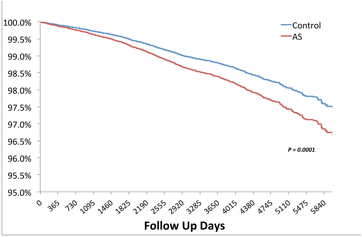Session Information
Session Type: Abstract Submissions (ACR)
Background/Purpose
OnSpA is a population-based study of spondyloarthritis (SpA) based on a provincial population of over 13 million. Patients with SpA are thought to be at increased risk of cardiovascular disease but it is unknown if they have excess vascular mortality. We explored risk of vascular mortality and the contributing factors in AS.
Methods
We performed a population-based, retrospective cohort study on incident SpA patients, age 15 or above, living in Ontario, Canada between April 1995 and March 2011. There were 21,878 SpA cases and 87,504 controls (matched for age, gender and socioeconomic status). The primary outcome was a composite event of cardiovascular or cerebrovascular deaths coded as the primary cause on death certificates. Considering the large size of the cohorts, we used standardized differences to compare the baseline characteristics of those with AS and their matched controls. Cox proportional hazards model was used to estimate differences in vascular mortality between cases and controls. Crude and adjusted hazard ratios (HR) were calculated and adjustments were made for coronary and cerebrovascular disease (CAD, CVD), cancer, diabetes, dementia, inflammatory bowel disease, hypertension, chronic kidney disease (CKD) and peripheral vascular disease (PVD). Additionally, we used a separate model in those with AS to identify covariates associated with vascular mortality. Finally, we constructed survival curves using the Kaplan-Meier (KM) method and tested for survival differences among groups using the Log-Rank test.
Results
In the SpA cohort 53% were male, with a mean age of 46 ±16 years, and a follow-up of 169,307 patient-years. Follow-up for controls was 692,499 patient-years. Crude and adjusted HR (95%CI) for vascular deaths were 1.49 (1.26-1.77) and 1.36 (1.14-1.63) respectively, indicating a 36-49% higher risk of vascular mortality in AS. Crude HR (95%CI) in males and females were 1.63 (1.31-2.03) and 1.31(1.00-1.71) respectively. Cases and controls had similar prevalence of CAD, CVD, PVD, dementia and diabetes, but IBD (6% vs 4%), hypertension (24% vs 18%) and CKD (2% vs 0.8%) were more common in SpA. The predictors of vascular death were age, male sex, low income, CKD and PVD apart from CAD and CVD. The KM curve showing an increase in vascular mortality in AS patients is shown in figure 1.
Conclusion
This is the first population-based study to demonstrate SpA is associated with significantly risk of vascular mortality. These new findings should prompt a comprehensive strategy to screen and treat modifiable vascular risk factors in SpA patients.
Figure 1. Kaplan-Meier Survival Curve of AS patients compared to non-AS controls after correcting for baseline variables
Disclosure:
N. Haroon,
None;
N. Nigil Haroon,
None;
P. Li,
None;
M. Paterson,
None;
R. D. Inman,
None.
« Back to 2014 ACR/ARHP Annual Meeting
ACR Meeting Abstracts - https://acrabstracts.org/abstract/spondyloarthritis-is-associated-with-increased-cardiovascular-and-cerebrovascular-mortality/

